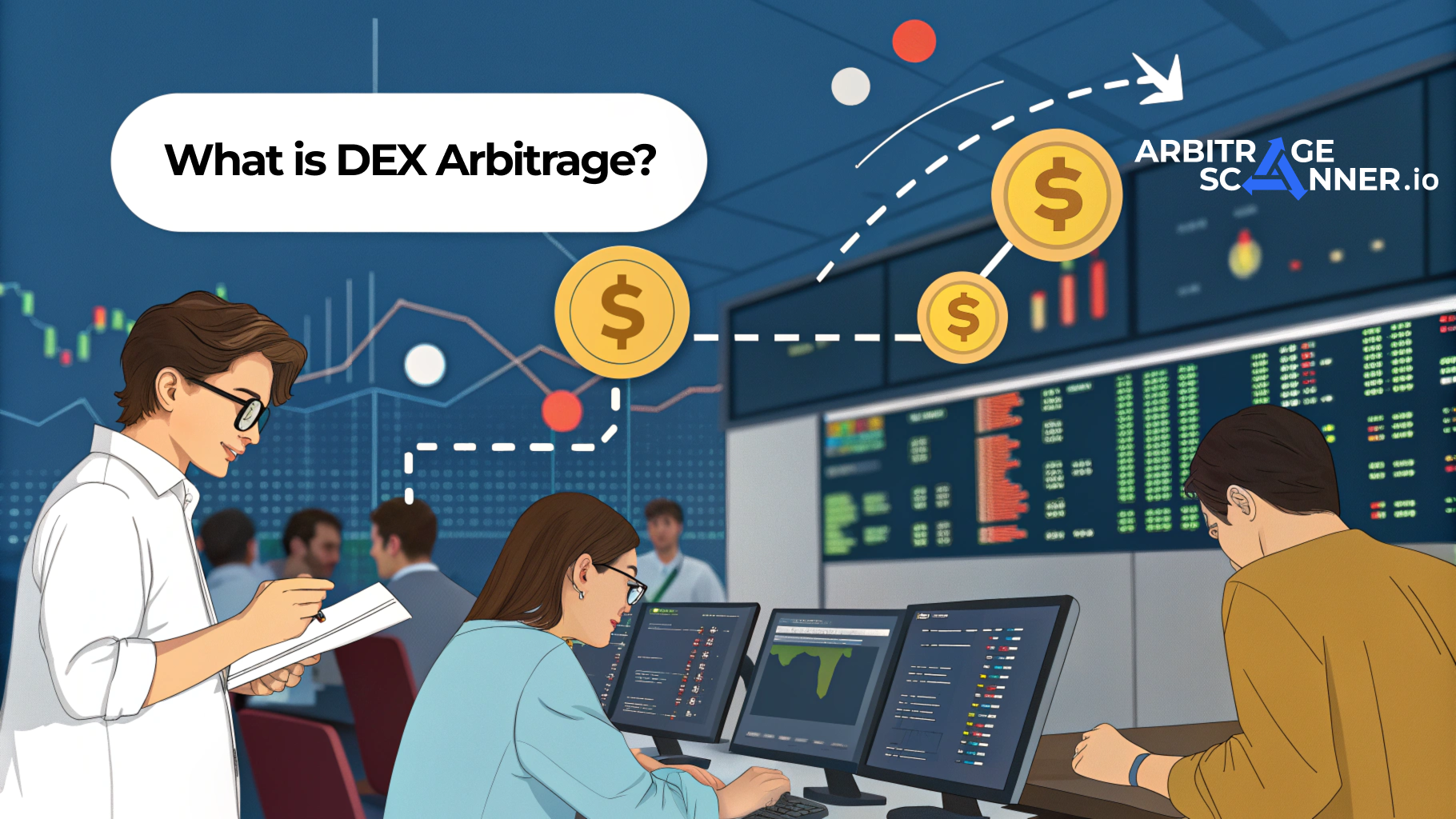What is DEX Arbitrage?

with ArbitrageScanner!
How Decentralized Exchanges Work
Decentralized exchanges (DEX) or decentralized exchange – from the name it is clear that these platforms are not centralized. That is, there is no management or company that could influence the platform's activities in any way. The functioning of such platforms is carried out through blockchain and smart contracts. It turns out that the platform has no management that can influence its activities in any way. Transactions on these platforms resemble P2P: two parties exchange cryptocurrency directly, without intermediaries, and the exchange itself occurs through multi-signature verification.
At first glance, the interfaces of centralized and decentralized platforms are very similar, but in the second case, there is a serious difference: here you do not need to identify your identity, and the client is responsible for their funds themselves. Cryptocurrency is stored in the clients' wallets, which connect to DEX platforms and conduct exchanges directly with other users of the exchange. Moreover, the order book is also not controlled by anyone, which eliminates the artificial increase in trading volumes, which centralized exchanges often sin.
The only thing that decentralized exchange developers can do is list new trading pairs, but only after voting within the community.
What is DEX Arbitrage
The emergence of DEX exchanges has been a real discovery for cryptocurrency arbitrageurs. Consider this: platforms with huge trading volumes, where new tokens appear not because the management decided so, but at the moment when the platform users voted. Moreover, there is no risk that the exchange will block your funds, right during arbitrage, simply because it considers the wallet from which you transferred cryptocurrency suspicious. There is no need to verify your identity, users are responsible for their own funds.
Why should you pay attention to DEX arbitrage right now? There are two main reasons:
-
While few people know about this method of arbitrage, many arbitrageurs are fixated on CEX exchanges. If you look at the information on the web, most of it is about arbitrage on centralized exchanges;
-
The spreads that appear on decentralized exchanges are better than on centralized ones. Moreover, nothing prevents you from arbitraging between DEX and CEX.
Many people still do not consider DEX exchanges due to the lack of management, which may make interactions insufficiently secure (in their opinion). This is what you should take advantage of, switching to DEX arbitrage and getting an increased spread for exchanging cryptocurrencies between exchanges.
Advantages and Risks of DEX Arbitrage
Now let's discuss the benefits that await an arbitrageur who decides to use DEX exchanges to make a profit:
-
High liquidity in popular pairs. Moreover, as already mentioned, liquidity on DEX cannot be artificially inflated, so if you see a lot of liquidity in the pool, it is really there;
-
Fast execution of transactions thanks to automated market makers (AMM). Unlike CEX, on DEX, AMM is responsible for executing transactions – a protocol that allows you to instantly trade tokens thanks to the liquidity pool created by the exchange users. This means that at the moment of detecting an arbitrage situation (spread), you can immediately buy the token, rather than placing your order in the order book and waiting for it to be executed;
-
A wide selection of non-standard tokens that cannot be found on centralized exchanges. DEX exchange communities can vote for the listing of tokens that CEX exchanges have rejected. As a result, there are many more options for earning on cryptocurrency arbitrage through decentralized exchanges.
Among the disadvantages of DEX arbitrage, a couple of points can also be highlighted:
-
High transaction fees in networks with an overloaded blockchain (for example, Ethereum). Since you directly connect your wallet to the DEX exchange, here you pay not a trading fee, but a network fee, as you are making a transaction. During periods of high network load, the fee can be as high as $5, which affects the final profit. On the other hand, everything depends on the deposit: if you are arbitraging with $200 in your wallet, then yes, the fee can "eat up" a significant part of the earnings. But if we are talking about a deposit of $20,000, then the final profit will still be large, and $5 is unlikely to stop you;
-
Risks of slippage due to volatility and changes in liquidity. Slippage on DEX occurs when the price of an asset changes during the execution of a transaction, especially in conditions of low liquidity or high volatility. This can happen with large orders that move the market or when liquidity in the pool changes sharply. To minimize slippage, it is important to monitor trading volumes and use limit orders in the presence of high volatility.
Technologies and Tools for DEX Arbitrage
The only thing that often stops arbitrageurs from switching to decentralized exchanges is the difficulty of tracking spreads on them. However, we have a solution to this problem: the best cryptocurrency arbitrage service Arbitragescanner tracks spreads on various DEX and CEX exchanges online. Thanks to the tools of the service, you will definitely be able to find a profitable combination for cryptocurrency arbitrage.
Finding profitable combinations for cryptocurrency arbitrage on DEX exchanges is done using two tools:
-
Arbitrage screener. Selects the best combinations on the spot market for users. You can set exchanges and coins, as well as specify a blacklist of coins that the bot will not search for combinations. Notifications about new combinations come to Telegram, and they can also be tracked in the web version of the service;
-
Futures screener. Selects combinations between the spot market and futures: the strategy involves the convergence of prices between two markets. First, you need to buy a coin on the spot cheaper on one exchange, and then buy a futures contract, with 1x leverage, on another exchange and more expensive. After the price convergence on both platforms, the transactions are closed, and you take your profit. Currently, the spot + futures strategy is the most profitable and safe.
Moreover, Arbitragescanner provides the best tools for on-chain analysis and message services that monitor messages in social networks by keywords. Arbitragescanner users earn thanks to the provided tools – do not stay away!
Practical Tips for DEX Arbitrage
Now let's discuss tips that will help not only to earn on cryptocurrency arbitrage but also to avoid losses due to lack of information.
-
Thoroughly analyze the cryptocurrency you are going to buy. The essence is that if a price difference for a coin has appeared, it will definitely appear again. Use its appearance to find out the liquidity of the asset. This is a standard mistake of beginners: to "bite" on a large spread, buy a coin and sell it for a cheaper price, as there is no liquidity in it;
-
Use automated tools from Arbitragescanner to facilitate the search for arbitrage combinations;
-
Be sure to track blockchain fees to include them in the profit calculation;
-
Be vigilant. Really good combinations disappear quite quickly, especially during market growth. Therefore, if you want to earn on DEX arbitrage, you need to react quickly.
Prospects for the Development of DEX Arbitrage
DEX arbitrage will develop only if decentralized exchanges continue to develop. With the advent of L2 blockchains, it can be said that DEX exchanges have received a "second wind":
-
Reduction of fees thanks to sidechains and parachains. During peak network loads and even in stable network conditions, these methods allow for significantly reducing transaction fees, of which a trader can make dozens per day, significantly increasing the profit from arbitrage on DEX exchanges with a small deposit;
-
Increased transaction speed. The use of L2 improves throughput, providing significantly faster transaction confirmations. This is a fundamental point for cryptocurrency arbitrageurs, as the price difference can disappear at any moment. Moreover, this allows DEX exchanges to operate more efficiently and reduces delays that can occur with high trading volumes on L1;
-
Support for more complex financial instruments. With the development of L2 on DEX, more complex trading products, such as futures contracts, have become possible. For example, DEX exchanges Apex Omni and Hyperliquid (supported by Arbitragescanner) offer futures trading;
-
L2 networks make it possible to create deeper liquidity for DEX exchanges, which helps in arbitrage strategies, as it allows transactions to be executed faster and with lower costs.
L2 blockchains have become a real discovery for decentralized exchanges, thanks to which they will continue to develop and offer services comparable to centralized platforms. And along with them, DEX arbitrage will continue to exist and bring profit, as there are no reasons for this opportunity to cease to exist.
Conclusion
DEX arbitrage represents a unique opportunity for traders using decentralized exchanges to profit from price differences on different exchanges. The advantages of this approach include high (not inflated) liquidity in popular pairs, the absence of intermediaries, and the ability to trade tokens that are not always available on centralized exchanges. However, like any other trading strategy, there are risks, such as high fees in overloaded networks and price slippage in volatile markets.
Arbitragescanner strongly recommends that you pay attention to DEX arbitrage, as the profit that arbitrageurs make on decentralized exchanges will pleasantly surprise you.
Want to learn more about crypto arbitrage?
Get a subscription and access the best tool on the market for arbitrage on Spot, Futures, CEX, and DEX exchanges.







